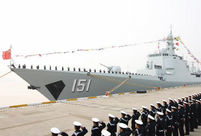 Harbin Int'l Ice and Snow Festival opens
Harbin Int'l Ice and Snow Festival opens 'Jin' named the word of the year by cross-strait netizens
'Jin' named the word of the year by cross-strait netizens Chinese scientific expedition goes to build new Antarctica station
Chinese scientific expedition goes to build new Antarctica station
 Chinese naval escort fleet conducts replenishment in Indian Ocean
Chinese naval escort fleet conducts replenishment in Indian Ocean 17th joint patrol of Mekong River to start
17th joint patrol of Mekong River to start China's moon rover, lander photograph each other
China's moon rover, lander photograph each other Teaming up against polluters
Teaming up against polluters
NEW YORK, Jan. 6 -- China would maintain steady and dynamic economic growth in 2014 on the back of its ongoing reforms, economists said at a forum here Monday.
The forum was co-organized by the New York-based National Committee on U.S.-China Relations and China Center for Economic Research (CCER) with Peking University (PKU).
CCEr economist Lu Feng said China was likely to maintain steady growth of 7.5 percent to 8 percent in real terms in 2014.
He said three factors would affect China's macro-economic performance during the year: the impacts of the external environment, its fight against pollution and its prudent macro-economic policy.
"China's exports are estimated to pick up modestly in 2014 from the preceding year, possibly reaching double-digit growth," Lu told Xinhua at a press conference, citing an expected improvement in the global economy, which would benefit Chinese export sectors.
Lu also highlighted China's macro-economic policy, which set a goal of balanced and sustainable development, adding the country would retain its status as the biggest contributor to the world's economy.
Huang Haizhou, managing director of investment bank China International Capital Corporation, said China's A-share market was likely to deliver an annual 20 percent return in 2014.
Justin Yifu Lin, former chief economist and senior vice president of the World Bank, said during his keynote speech that China was likely to maintain a dynamic economic growth in the next decade and more.
"China achieved an average of 9.7 percent growth continuously for 35 years. I would say it's a miracle in human history," Lin said.
China would maintain an average annual growth rate of 7.5 percent to 8 percent in the next few years, and had the potential to keep the rate at about 7 percent to 8 percent in the following 15 years, Lin forecast.
It would be "easy" for China to maintain the growth rate, when all the conditions facing the Chinese economy were put together, Lin said.
He cited several reasons for his optimistic opinion. Firstly, the potential for investment in industry upgrading, technology innovation and environmental improvement was huge as China was still a middle-income country.
Secondly, China would continue to see an improvement in labor productivity, he said.
Thirdly, total government debt only accounted for 39.4 percent of China's gross domestic product (GDP), still low by international standards, though it holds 3.7 trillion U.S. dollars in foreign exchange reserves, Lin said.
If China wanted to target the growth rate, certainly it needed to develop its economy according to its own competitive advantages as well as unlock domestic forces, given a deceleration in both exports and investment, the other two of the so-called "Troika" of GDP growth, in the aftermath of the latest global financial crisis, he said.
"I'm quite sure China has the ability to do that," Lin said, expressing optimism for its ongoing and long-standing progress of transformation from an export-driven to a domestic-consumption-driven economy.
Lu also told Xinhua consumption was expected to contribute increasingly to China's growth, likely occupying 40 percent of GDP in 2014.
If China achieves the growth target of 7 to 8 percent in next decade and a half, it would certainly be good for the world, Lin said.
In the meantime, he warned of some risks facing China, such as income disparity and corruption.
The third plenary session of the 18th Communist Party of China (CPC) Central Committee last November declared China would deepen its economic reform to ensure the market would play a "decisive" role in allocating resources.
Lin said the key point was the price must be determined by supply and demand to adapt to the shift in the definition of the market's role in the economy from "basic" to "decisive".
He also said more reforms should be implemented in factor price determination to reduce factor-market distortion and rent seeking.
Lin also voiced concern over China's shadow banking, which was becoming a source of instability in China's financial system.
China Broad Capital chief economist Mingchun Sun told the forum there was likely to be some defaults in China's shadow banking sector, though a systemic implosion in next two or three years was unlikely.
"The real challenge would be in 2016 to 2018," Sun cautioned.
 Chinese Consulate General in S.F. burned for arson attack
Chinese Consulate General in S.F. burned for arson attack Roar of J-15 fighter is melody for operator on the Liaoning
Roar of J-15 fighter is melody for operator on the Liaoning A 90-year-old forester's four decades
A 90-year-old forester's four decades Most touching moments in 2013
Most touching moments in 2013 2013: Joys and sorrows of world politicians
2013: Joys and sorrows of world politicians Missile destroyer Zhengzhou commissioned to Chinese navy
Missile destroyer Zhengzhou commissioned to Chinese navy China is technically ready to explore Mars
China is technically ready to explore Mars Photo story: Life changed by mobile technology
Photo story: Life changed by mobile technology Bullet train attendants' Christmas Eve
Bullet train attendants' Christmas Eve Cradle of high-speed train CRH380A
Cradle of high-speed train CRH380A  'Red Army' division conducts winter training in N China
'Red Army' division conducts winter training in N China  Classic scenes come to life
Classic scenes come to life Harbin Int'l Ice and Snow Festival opens
Harbin Int'l Ice and Snow Festival opens  Cindy attends commercial event with her parents
Cindy attends commercial event with her parents Get to know China's national pole dancing team
Get to know China's national pole dancing teamDay|Week|Month